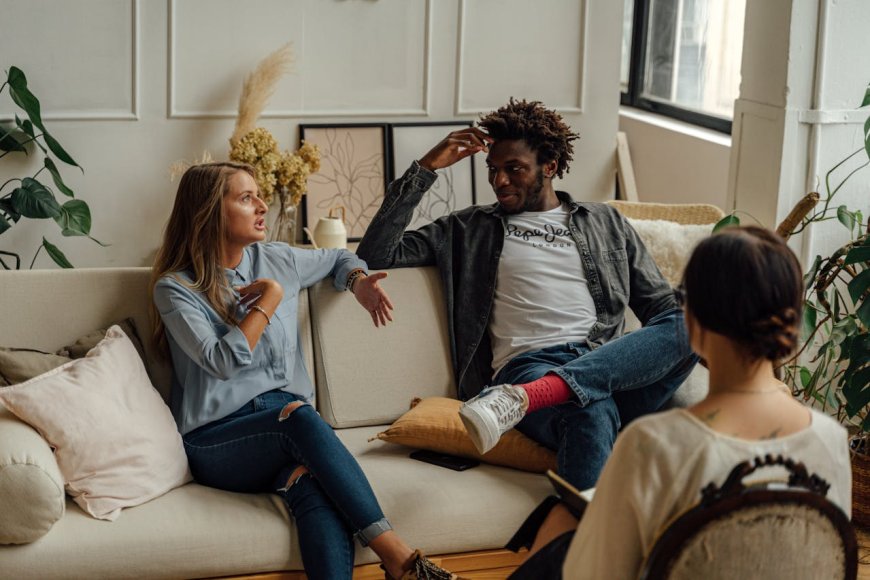How to Choose the Right Couple Counselor for Your Relationship
Research indicates that couples who stick with therapy often see more significant, long-term improvements.

It’s surprising how many people end their relationships without ever considering couples counselling. Many relationship issues can be resolved with the right support.
Research shows that couples who work through their challenges and stay together often find greater happiness than those who divorce. If it’s safe and feasible, it might be worth investing in your relationship before making a final decision to part ways.
Whether you aim to save your marriage or seek a healthy way to end things before they get worse, finding the right therapist is crucial. In this post, we'll offer some practical tips to help you find a skilled and effective counsellor who can guide you from “you and me” to “we.”
1. Choose a Therapist Who Remains Neutral
Ensure your therapist doesn’t let their personal beliefs about relationships or marriage sway their guidance. A skilled therapist will remain impartial, helping you explore your options and make your own informed decisions. Remember, while therapists are experts in their field, you are the expert on your relationship and your life. If your beliefs are particularly strong or if you are deeply religious, you might want to find a counsellor who shares your values or has a spiritual perspective. For multicultural marriages or families, a therapist with cross-cultural awareness can be especially beneficial.
2. Find a Specialist in Couples Therapy
When searching for a therapist, make sure they specialize in working with couples counselling. Many therapists may work with couples but lack specific training in relationship dynamics. Look for a licensed professional, such as a Licensed Marriage and Family Therapist (LMFT), Licensed Professional Counselor (LPC), Licensed Clinical Social Worker (LCSW), or Licensed Psychologist. Verify that they have received training and supervision in couples therapy.
Avoid spending your session time teaching your therapist about relationship terminology or issues. If your relationship involves specific considerations—such as ethical non-monogamy, LGBT+ identities, kink/BDSM, non-binary perspectives, or BIPOC experiences—ensure the therapist has relevant expertise and training in these areas.
3. Ensure They’re Trained in Couples Therapy
Verify that your therapist has specific training and experience in couples counselling. Couples therapy differs significantly from individual therapy and requires a unique skill set. Even highly skilled individual therapists might struggle with couples' work if they lack specialized training or experience. Look for therapists who have dedicated training in this area and a genuine passion for working with couples.
4. Feel Comfortable Sharing Your Concerns
It’s crucial that you feel at ease discussing any concerns with your therapist. If you’re uncomfortable with the direction of the therapy or have reservations, your therapist should be receptive and open to your feedback. A good therapist will listen to your concerns and work with you to address them, ensuring that you feel heard and supported throughout the process.
5. Commit to Therapy for a Set Time Before Deciding
Research indicates that couples who stick with therapy often see more significant, long-term improvements. In the beginning, as you and your therapist start to understand each other and your relationship, it may take some time to settle into a productive routine. Therapy often involves immediate adjustments as well as deeper, systemic changes to improve long-term relationship dynamics. It’s generally a good idea to commit to at least 8 sessions to gauge progress and determine if the therapy approach is effective for you. If there are clear issues from the start, it’s okay to reassess earlier but give it a fair chance before making a decision.
6. Provide Honest and Frequent Feedback
While your therapist’s training and experience are important, they aren’t experts on your relationship—you and your partner are. Be prepared to offer honest feedback during sessions. A skilled therapist will welcome your input and use it to better understand your unique relationship dynamics. If you notice any issues or feelings emerging during therapy—whether it’s resistance or dynamics between you and the therapist—share these insights. They can reveal important patterns and areas for exploration. Openly discussing your expectations and concerns from the beginning helps ensure that therapy is as effective as possible.
7. Assess Whether Your Therapist Makes You Feel Safe
Emotional safety is crucial in couples counselling. Some couples hesitate to enter therapy because they fear that discussing their issues might worsen their situation. A competent therapist creates a safe environment by managing sessions effectively and ensuring both partners feel validated and heard. They should actively guide conversations, interrupting when necessary to keep discussions on track and productive. This approach helps prevent sessions from becoming unproductive and ensures that the focus remains on resolving key issues.
Final Thoughts
These strategies can help you find a couples counsellor who will support you effectively. While it may take some time and effort to find the right fit, investing in this process will pay off in the long run. A thoughtful approach to selecting a therapist can lead to a more positive and rewarding counselling experience, and you’ll appreciate the effort you put into making the right choice.
What's Your Reaction?






















